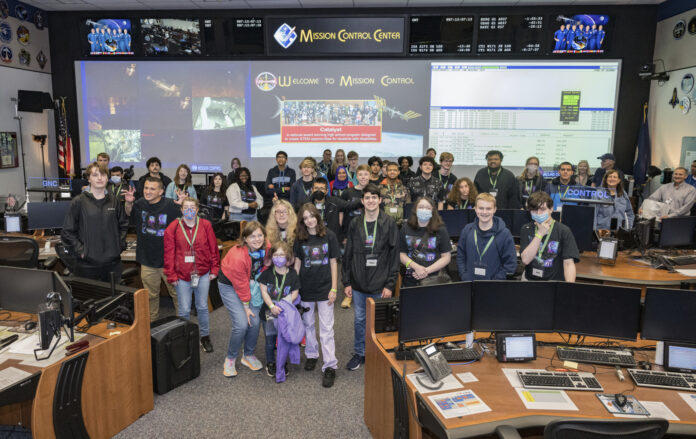Throughout my career as an educator, the gap in employment rates between people with disabilities (38% in 2024) and those without disabilities (75%) always stuck in my head.
As an educator, I knew I needed to be part of the solution. The “factory model” of public education was not working for these students. As I told my students: the children do not have the disability; the system does.
I taught preK-12 as a special education and science teacher for 20 years, and 98% of my students were low-income and people of color. I saw firsthand the benefit of high-quality STEM education. I helped students with varying abilities transcend education inequality by training for high-demand careers so they could succeed in a competitive workplace.
Perhaps the most critical element I discovered during my teaching career in public school is that all students can learn through STEM hands-on learning.
I decided to start a new program that could meet the needs of high school students with disabilities and be part of the catalyst for change.
Catalyst is a free award-winning program located at the Science House at NC State University whose mission is to build a diverse, inclusive, and innovative STEM workforce in North Carolina. We serve high school students with disabilities who are in regular education (AP classes, honors, regular ed) and the Occupational Course of Study Program. Students can be in public, charter, private, or home schools.
Persisting barriers
There were and are barriers to students accessing high-quality, engaging STEM instruction. Earlier in my career, I was only given a budget of $1.50 per student per year for supplies and had no access to the lab classroom, which meant I had to apply for grants to get the materials I needed.
There are still low expectations of students with disabilities, and many students don’t have access to special education teachers with experience and knowledge of the wide range of STEM career pathways.
Teachers need support, smaller class sizes, curricular flexibility, less pressure on teaching towards tests, budget for supplies, time for preparing labs, and more professional development in STEM and Universal Learning Design (UDL).
I have always called myself a STEM teacher who could teach all learners, not a special education teacher. I hope one day there will be no need for “special education teachers,” because all teachers will be able to teach all learners. This will indeed help all learners, not just students with disabilities.
Exposing high schoolers to the world of STEM
Catalyst aims to do our part in changing these realities.
We have won many local, national, and international awards. We were the only team to win the MIT InvenTeam Award with all Students with Disabilities. Our biggest award, however, is that all of our students are doing well in a wide range of STEM fields in college, from astrophysics to electric and mechanical engineering.
Our students attend a wide range of colleges, from UNC-Chapel Hill, NCSU, and UNC- Charlotte to Wake Technical Community College. Our students are graduating with STEM degrees from associate to master’s degrees. Our students are working in the STEM workforce, demonstrating that, with the right supports, opportunities, and experiences in their educational careers, they can succeed.
The program includes:
- A wide range of STEM content, skills, and fields taught by professors, graduate students, and industry professionals.
- Paid STEM internships in research labs at NC State University, or with government and industry partners.
- Workforce and college readiness skills.
- Life 101 skills, like stress management and navigating a college campus.
- A week-long summer session, plus Saturday sessions during the school year.
- Options for a year-long or multi-year program.
- International, out-of-state, and in-state field trips.
- Case management, resource support, and transition planning.
- Optional certifications in Quality Assurance and AI.
- Annual reach for the Stars! Be A Star! STEM and Resource Fair for K-12 Students in NC with Disabilities, Family and Friends
Upcoming chances to learn more
If you are interested in learning more, we have open houses coming up: virtually on Jan. 16 at 7 pm, or in-person at NC State University on Jan. 18 at 10 am. Use this link to register. During registration, more detailed information will be provided about location for the in-person event and a link to join for the virtual event.
We will also be a part of the NC Science Festival in April, which is open to the whole community. Save the date for our third annual free, “Reach for the Stars! Be a Star!” STEM and resource fair for K-12 students with disabilities, families, and friends on Saturday, April 25, from 9 am to noon at the McKimmon Center at NC State University. No registration is required.
We will have over 70 tables with STEM content, career opportunities, and educational pathways, led by professors, graduate students, and community and industry partners. There will be hands-on STEM opportunities for students to explore and learn at all levels, a free raffle, gift bags, and speakers on a variety of topics like disability Services in college, how to succeed in college with a disability, and much more.
We’ve had government officials attend like Gov. Roy Cooper, Congresswoman Deborah Ross, Congressman Nickle, and state Rep. Sossoman. We hope to have more attend this year to support students with disabilities in STEM careers. We want all students with disabilities to know they can be STEM stars.
Contact Joann Blumenfeld by email at jrblumen@ncsu.edu for more information, and follow us on Facebook here.
